1956 Bedford RL-based fire tender motorhome conversion
Posted by Chris Graham on 23rd July 2022
Converting a 1956, former Civil Defence Bedford RL-based fire tender into a luxury motorhome was a labour of love, as Iain Wakefield reports.
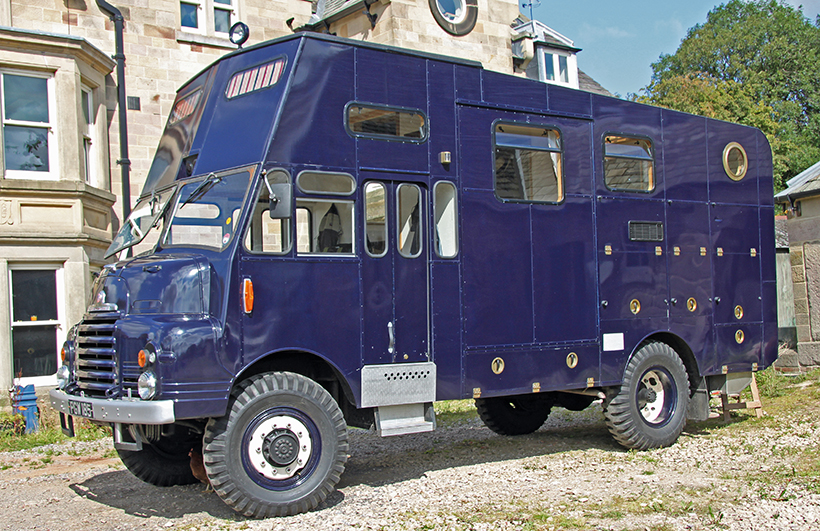
Mitch Harrison’s Bedford RL-based fire tender motorhome conversion is certainly an eye-catching vehicle.
Converting this 1956 Bedford RL-based fire tender (aka, ‘Green Goddess’) into something the original manufacturers would never have dreamed possible, may seem abhorrent to diehard enthusiasts.
But, with plenty of examples of these Cold War-era vehicles still in existence this is, perhaps, one that can be forgiven, especially when one snatches a sneaky peek into the Tardis-like area living area and considers the overall quality of what’s been achieved.
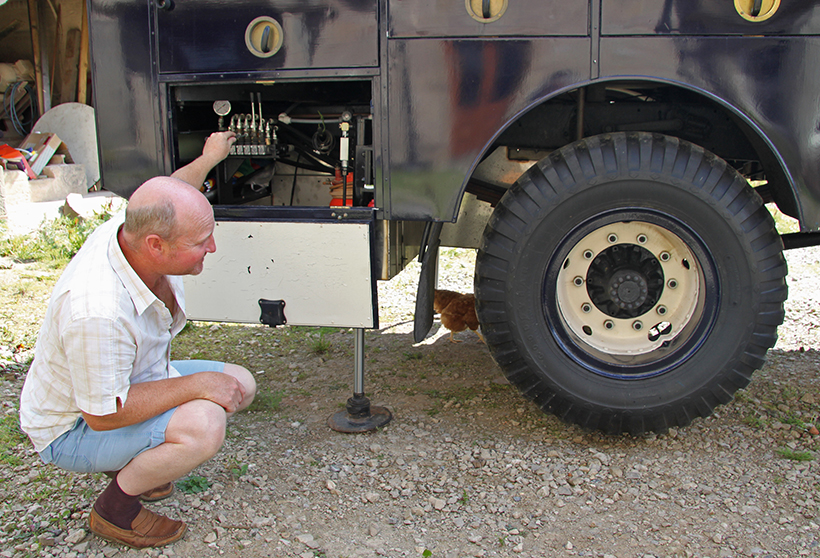
The hydraulically-operated self-levelling system allows the Green Goddess to sit level when parked on rough ground.
Derbyshire-based Mitch Harrison bought PGW185 for £1,500, in 2009 from Withams, who had been entrusted with disposal of the bulk of the remaining Green Goddess fleet. “I have a fascination for unusual machinery and really enjoy a challenge. This project certainly stretched my imagination and abilities, but I’ve been in the building business all my working life, so nothing really fazes me when it comes to conversions”, said an obviously proud Mitch.
Sympathetic conversion?
The front (cab) part of this conversion is remarkably standard. All the dials and most of the original equipment remains in place and a pressed steel panel located between the front seats still hides a 4.9-litre straight-six petrol engine driving though a four-speed gearbox.
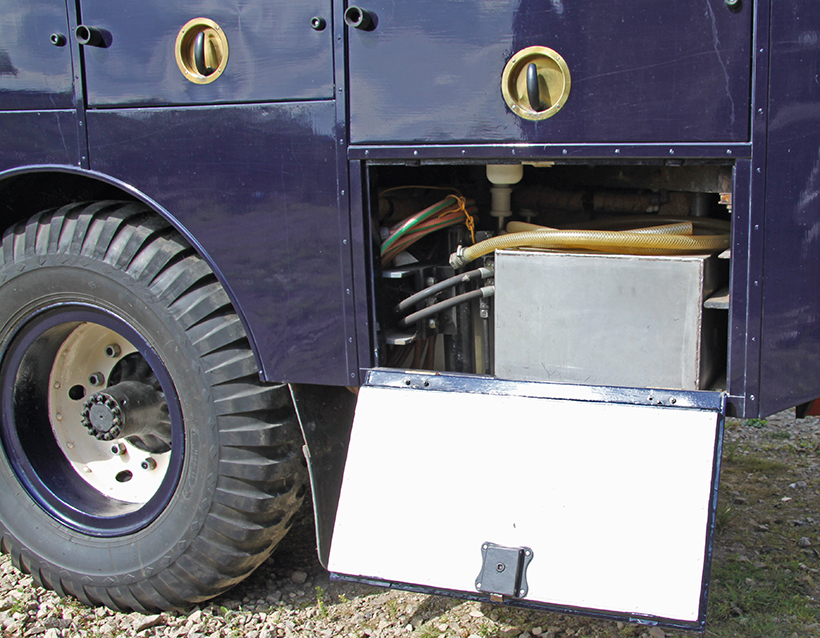
One of the original, external lockers now houses the hydraulic fluid reservoir.
Behind the front seats, however, it’s a totally different story. Where once was water storage and pumping equipment there’s now five star luxury accommodation equal to any modern motorhome. Inspiration, apparently, came from a visit to a motor caravan show. “We were very impressed with those big American-style campers featuring expandable side pods. At the time I didn’t have a clue what to do with the Green Goddess. “However, visiting the show got me thinking so I drew up plans to convert the fire tender into a classic luxury motorhome, incorporating a pair of expanding sides pods”.
“The first job was to strip out the 400 gallon galvanised water tank, fire pumps and associated hoses and connections. Although I wanted to keep the exterior as original as possible, the roofline needed to be raised slightly so I could sit up in bed. Most of the rear body is made from marine ply and sheet aluminium Removing too many internal partitions at one time could have resulted with the whole body collapsing like a house of cards, so work proceeded carefully until all the unwanted kit and partitions were out of the way.”
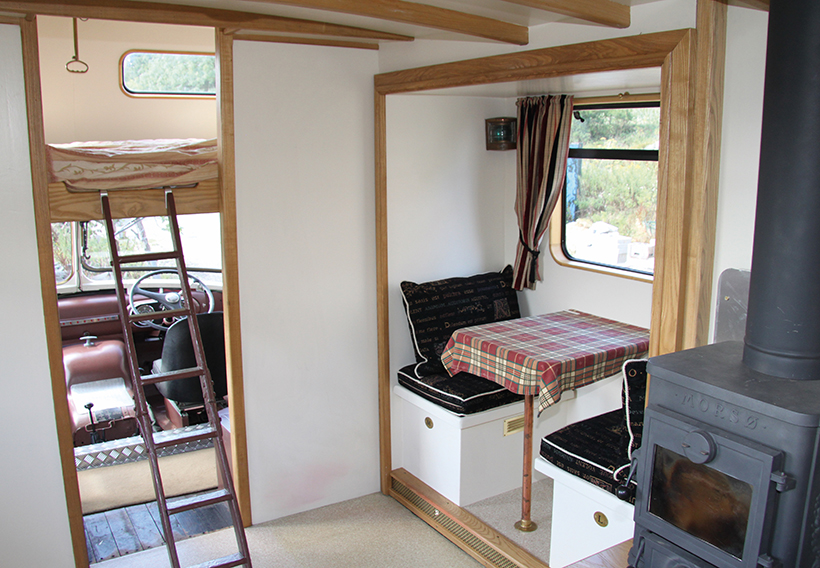
Caravan interior, with the side ‘pod’ out. All done to an extremely high standard. Ladder leads to sleeping accommodation above cab.
Extra living space
What really makes this conversion stand out are the hydraulically operated expanding sides pods. Mitch opened one of the side lockers to show where the ‘brains’ for the hydraulics were housed. According to Mitch, it’s essential that the vehicle is sitting on an even keel before extending the pods. This can be difficult on a hilly campsite, so Mitch has installed an ingenious hydraulically-operated self-levelling system with legs at each corner to raise and level the vehicle.
With the Goddess now level, Mitch demonstrated how the side pods operated. These have to open slowly at first, as there’s a thick blade-like rubber seal running around each opening that has to flip over and reverse direction as the pods slide in and out. “Getting the spacing right for these seals to fold over correctly was a time consuming job and required a fair bit of adjustment. That’s why I always start the opening and closing procedure slowly so all the seals face the correct way”, added Mitch.
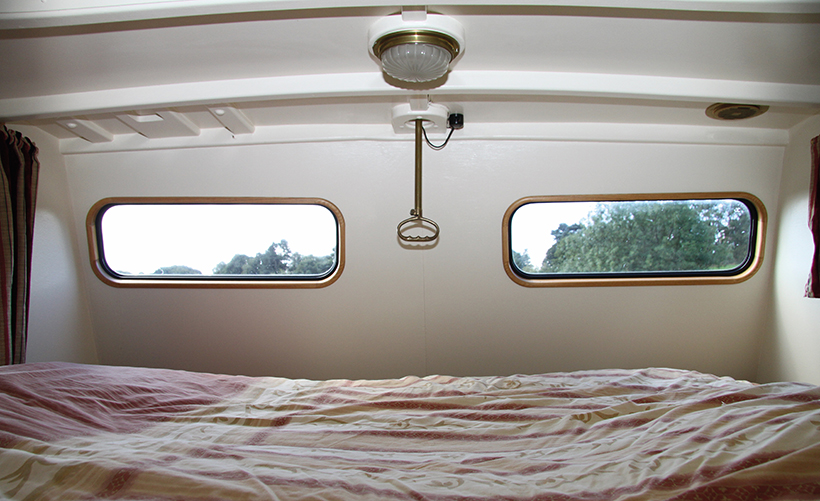
The area above the cab provides a decent main bedroom. The handle between the front windows operates the roof-mounted spotlight.
With the side pods fully extended, the interior certainly takes on a new dimension. The extra width allows the two seating areas on each side to be fully utilised. One thing that really stands out with this conversion though is the quality of the workmanship. Mitch freely admitted that he couldn’t take too much responsibility for this as he employs several very talented carpenters. He did, however, design and install the complex plumbing, electrics and hydraulic systems for the domestic services and side pods.
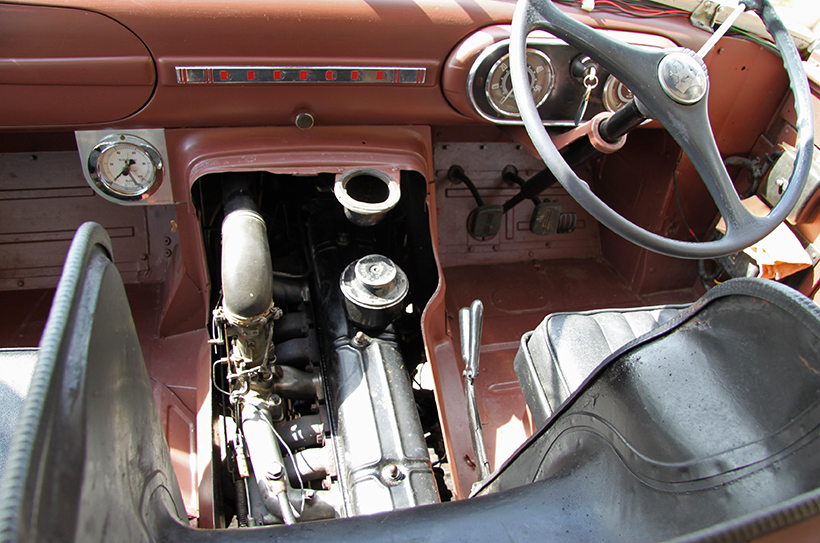
The 4.9-litre, straight-six engine is in good order, with the vehicle having covered a very low mileage. Even so, 10mpg is just about as good as it gets.
Home from home
Mitch has a serious dislike of cramped caravan shower cubicles, so the first area he planned was the shower room based around a standard 900mm shower tray. This is at the left-hand rear corner of the living space, opposite a similar sized area housing a cassette-style toilet and wash hand basin. Cleverly positioned underfloor tanks hold the waste water and around 40 gallons of fresh water, which Mitch reckons is sufficient for almost a week’s camping with two people using the vehicle. As well as a full-size log burning stove to keep the main living space cosy, Mitch has installed a domestic-style combi boiler running off bottled gas to supply instant hot water and feed two sinks plus several radiators.
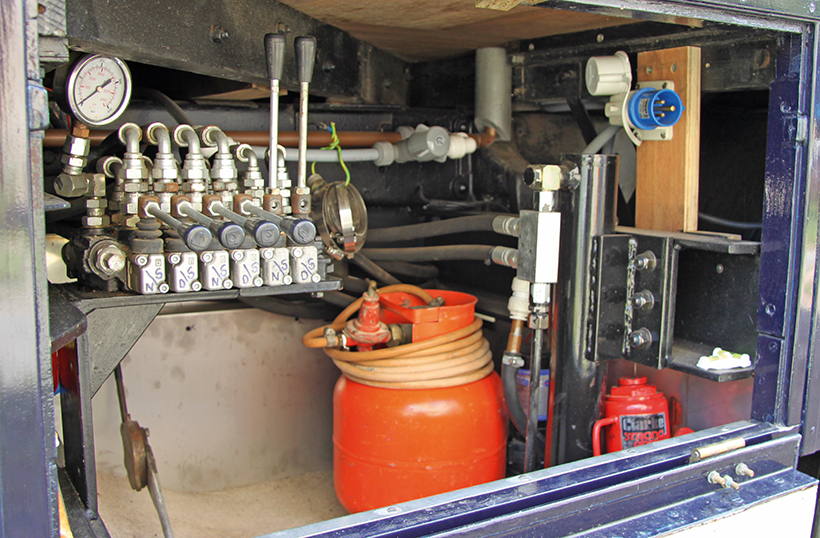
The valves and associated pipework required to operate the expanding sides pods are located in one of the side lockers.
Standing in the middle of the living area and looking towards the cab, we were interested to explore where the ladder led. This, Mitch explained, provided access to the compact sleeping compartment featuring a double bed located over the cab area. “Up there is the bedroom and yes, the spotlight on top of the vehicle still works and we can control it while in bed.
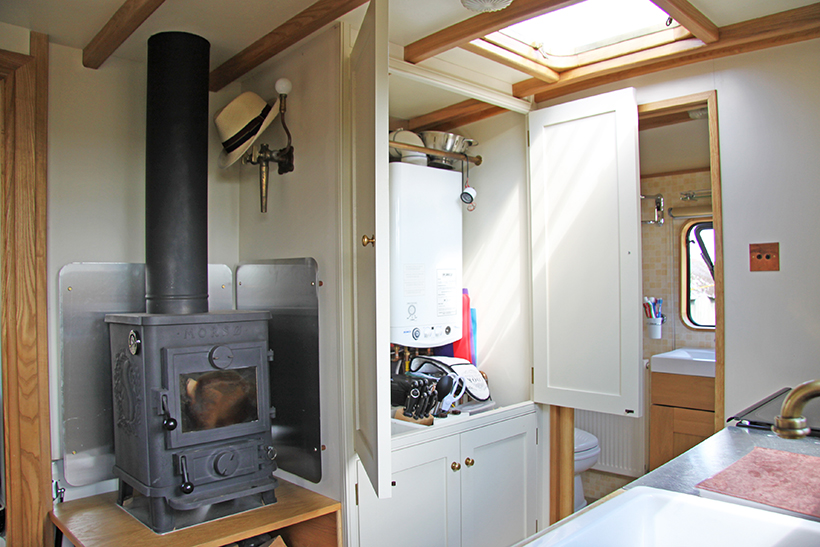
Although a log-burning stove adds a homely touch, the fully enclosed Combi boiler provides hot water on demand, as well as servicing the central heating.
On the road
“One of the first questions I’m usually asked is how fast it goes”, said Mitch. “The answer is around 40 to 45mph. This is a good cruising speed, although the manual claims the top speed is sixty but I wouldn’t like to try it”. Fuel consumption, however, is “shocking” when compared to a modern vehicle; 10mpg is typical and it can drop to single figures when climbing a steep hill, so it’s always nice to take your foot off the gas and coast down the other side to save a bit of fuel.
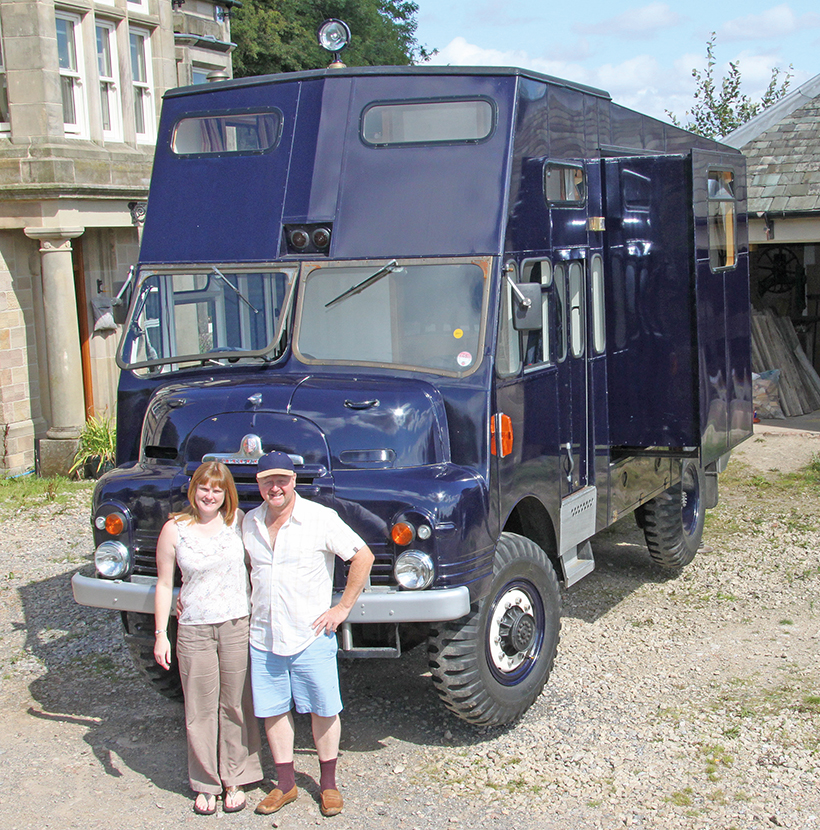
Mitch claimed that despite a lack of power steering, the Bedford is a really easy vehicle to drive, a fact wholly endorsed by his wife. Asked what sort of reaction the Goddess get when it turns up at a campsite and enquiring how much the conversion cost, Mitch claimed the reaction varies from mild curiosity to jaw dropping amazement when the legs go down and the side pods extend. “What really impressed me about this vehicle when stripping it out was the build quality, which was really superb”, claimed Mitch. Cost-wise, Mitch reckons the total cost of the conversion, excluding the original purchase price, is around £15,000. That may sound a lot but with a new motorhome of equal size easily could easily cost five or six times that.
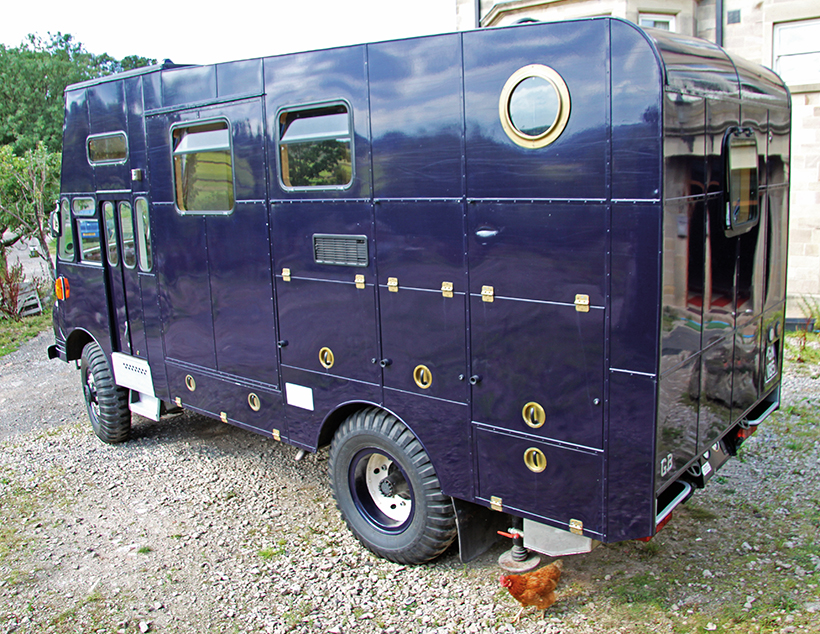
Side windows and a higher roofline, but original side-locker have been retained and re-purposed.
Mitch’s vision, expertise and hard work have all combined to produce a unique and very practical classic vehicle that he and his family will get a lot of pleasure from for many years to come.
This feature comes from the latest issue of Classic & Vintage Commercials, and you can get a money-saving subscription to this magazine simply by clicking HERE
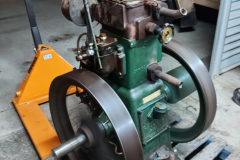
Previous Post
3½hp Lister CS stationary engine brought back to life
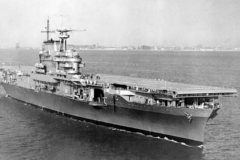
Next Post
The decisive Battle of Midway explained



